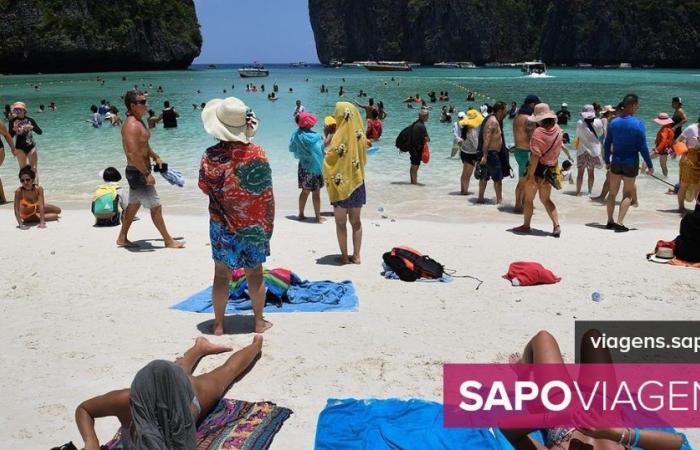
By Karinne Delorme
Just like Venice, which established the payment of a fee for daily visitors starting last Thursday, several destinations around the world are imposing measures to limit the massive arrival of tourists, which leaves cities crowded and harms their inhabitants.
Limited groups
In Spain, the second main tourist destination in the world behind France and which is on track to break its 2023 visitor record this year, several cities on the brink of saturation have announced measures to calm the fury of their inhabitants.
The coastal city of San Sebastián, in the Basque Country, limited tourist groups in its historic center to 25 people and banned guides from using megaphones.
Barcelona, one of the most visited cities in the country, has also banned groups of more than 20 people from its famous la Boqueria market.
For its part, the Andalusian city of Seville wants to make non-residents pay for access to the famous Plaza de España.
War on cruises
The popular Spanish island of Mallorca, in the Balearic Islands, has authorized a maximum of three daily cruises in its port since 2022, including just one “mega-cruise”. The neighboring island of Menorca will, in turn, limit access for private vehicles.
A symbol of mass tourism, the Croatian port of Dubrovnik has imposed a limit of two cruises per day since 2019, with a maximum of 4,000 passengers each, in view of the image of thousands of visitors accumulated in its medieval alleys (depicted in the series “Game of Thrones”).
Expanding its long list of measures against mass tourism, Amsterdam last year banned the arrival of cruise ships in its historic center, a measure in force in Venice since 2021.
Limited access to Machu Picchu
A real puzzle for the Peruvian authorities who, on several occasions, restricted access, the Inca city of Machu Picchu was placed in 2011 as a UNESCO World Heritage Site under “high surveillance” due to the “excess of visitors”.
Currently, only around 4,000 people are allowed in daily to see the ruins.
Reservation in the Calanques
In southeastern France, the Calanques National Park imposes a reservation system to access the Sugiton cove, threatened by erosion, with a maximum of 400 people per day in summer, compared to 2,500 previously.
French authorities have also set a limit on summer visitors to the Mediterranean island of Porquerolles or the island of Bréhat off the coast of Brittany in the English Channel.
The end of “The Beach”
In Thailand, the island paradise of Maya Bay on the island of Koh Phi Phi Ley was closed between June 2018 and January 2022 for complete coral reef restoration.
Immortalized in the 2000 film “The Beach”, with Leonardo di Caprio, the place was devastated by years of mass tourism.
Up to 6,000 visitors came to this 250-meter narrow beach every day, causing an ecological catastrophe due to severe erosion and the deterioration of coral reefs.
The site was reopened with a ditch that limited movement.
Replicas of prehistoric caves
Discovered in 1940 in southwestern France, the prehistoric Lascaux cave has been closed to the public since 1963. The flow of people and adjustments made to facilitate access have destabilized the site.
Between 1983 and 2016, three replicas were erected, allowing visitors to admire the cave, which has been listed as a UNESCO World Heritage Site since 1979.
Mount Fuji and geishas
Also a victim of its own success, the mythical Mount Fuji, near Tokyo, will from this summer apply a fee of 2,000 yen (almost 12 euros) and a maximum fee for access to its most popular walking trail.
In addition, the city of Kyoto, faced with an increase in the number of nosy visitors, banned tourists from entering the private streets of the famous geisha district.
Tags: Fees limits bans worlds popular destinations protecting overtourism News
--




